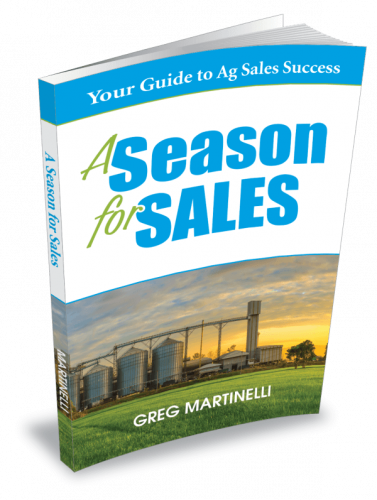And the 4 Levels of Competence

In any training workshop, there always comes a time when a bit of comedy breaks out. The chart above seems to always draw out one of those moments. When the subject turns to competence and consciousness, we tend to make a lot of jokes at our peer’s or manager’s expense. The chart looks lofty and more like abstract theory. Yet closer scrutiny reveals an interesting concept in how we learn. And how we stop learning as we progress through our sales career.
Across the board in the pre-workshop surveys and assessments, the number one motivating factor for Ag salespeople is to be most competent salesperson in their market. Mostly, this refers to technical competence and the ability to grow the most-best crops/livestock, to be the most competent ag lender, the most knowledgeable on tractors, crop insurance, etc. This is great and definitely part of our jobs; to be competent with our products.
To achieve this level of competence, we need to have a steady diet of learning. However, learning is a challenge at different stages of our career. Let’s examine what happens from the beginning of our sales career, through the middle years and into the later years. I found the Competence-Consciousness quadrants to be helpful to understand the stages of learning we go through as adults.
Unconscious Incompetent
This is mostly associated with the new salesperson. At this stage, you are unaware of the tasks and don’t know how to do those things needed to do your job. Basically, you are unaware and don’t know that you are unaware. While you are bumbling around in this stage, you might have some success, but have no idea why or how it happened.
Conscious Incompetent
You are now aware of the skill or task, but you are still unable to accomplish it. This is the great learning stage as you identify the needed skill or knowledge and go after it. Focus on the most import skills needed for your role. Keep a balance between technical skills and selling skills. Both are important.
Conscious Competent
At this stage, you are both aware of the skill and you are competent at completing it. Great! But there lies a danger emotion in this stage: complacency. It’s part of human nature. In the conscious competent stage, we have a certain amount of success. We can very easily begin thinking that we mastered this task due to our success. Therefore, we don’t need to continue to learn or practice this skill. After all, we must know how since customers are buying from us. This complacency can begin to look like arrogance. And arrogance can easily stall your ability to learn and improve your selling skills.
The challenge at this stage is to balance between confidence and arrogance so you don’t become complacent. Obviously, confidence is critical to selling success. Confidence in your product, your company and yourself help you convince customers to buy. However, like fertilizer, too much of a good thing can be a bad thing.
When coaching someone in this stage, it’s critical they understand that they still need to improve. They still need to continue their competency training. Technical information is changing at an ever-faster rate. While selling skills remain fairly constant, practicing and training on them helps us continue to hone them.
Salespeople in this stage will often say, “I have been at this for 20 years. I think I have figured out how to sell”. Hopefully, they realize there is always room for improvement. Even the greatest players have coaches and continue to practice.
Keep learning. Keep an open mind when it comes to your skills and knowledge. As best you can, balance between confidence and arrogance.
Unconscious Competent
Like any skill which you repeat over and over again, your mind stops thinking about it. It’s like we are on auto pilot, literally. Think about driving a car. We switch lanes, turn on blinkers, drive to and from work each day, and never really think about it. In sales, we ask questions, solve customer problems, or give a sales presentation as if on auto pilot. “Been there, done that, and forgot more than most people will ever learn.” is our motto in this stage.
One of the best methods for helping someone in this stage is feedback. It might be in the form of coaching, assessments or surveys.
Obviously, I am a big fan of coaching as it is one of the most effective and intense ways to improve a salesperson’s performance. Business coaching has two primary components: reflection and accountability. Our role as a coach is to hold up the mirror and allow the salesperson to see themselves. Then, we hold them accountable to their improvement plan. That’s why it works so well for the unconscious-competent salesperson. They know how, but have slipped into auto-pilot mode. Coaching brings those skills back into their conscious world so they are aware of them again.
The one skill that I see most frequently lost in this stage is asking good questions. This salesperson feels like they have seen it all and there’s no need to dig very deep. To save time and be efficient, they make assumptions. They think to themselves, “A 1500-acre grower, split between corn-beans, maybe a little wheat? I’ve sold to hundreds of producers like you. Here’s what you need.” This salesperson goes directly into presentation mode with customers instead of asking good questions to uncover the best fit for their products.
Assessments and surveys are also effective at helping the unconscious-competent salesperson realize their gaps. When coaching a salesperson and it’s not working to create change, you might implement an assessment. 360 feedback assessments, DISC assessments, and customer surveys can be an effective method to bring a salesperson back into consciousness in an area. Peer pressure is an amazing power, even well into our adult years. You would be amazed at how people react to a 360-feedback assessment. Something I might have said to a salesperson many times is disregarded. However, reading it on a 360 can really bring a point to light for a person.
To implement this into your selling skills, take a look at some of the primary selling skills below.
- Prospecting for new customers
- Asking customers high value questions
- Positioning my products
- Closing skills
- Follow up skills
I’ll assume, that you are at least conscious of these skills. As a salesperson, you know you need to learn these five skills.
If you are new to sales and at the beginning of your competence journey, then seek out information, training, coaching and mentoring.
However, if you have been selling for 10 or more years, think about your last 5-10 sales calls. Did you implement these skills? Did you think about them or did you operate on auto-pilot? You might consider renewing your skills!


